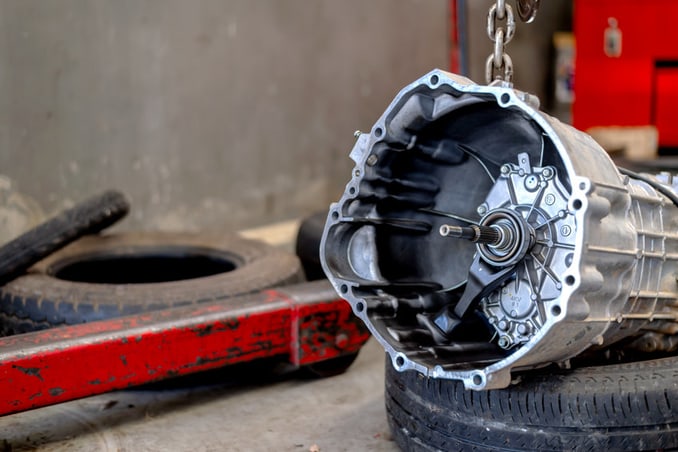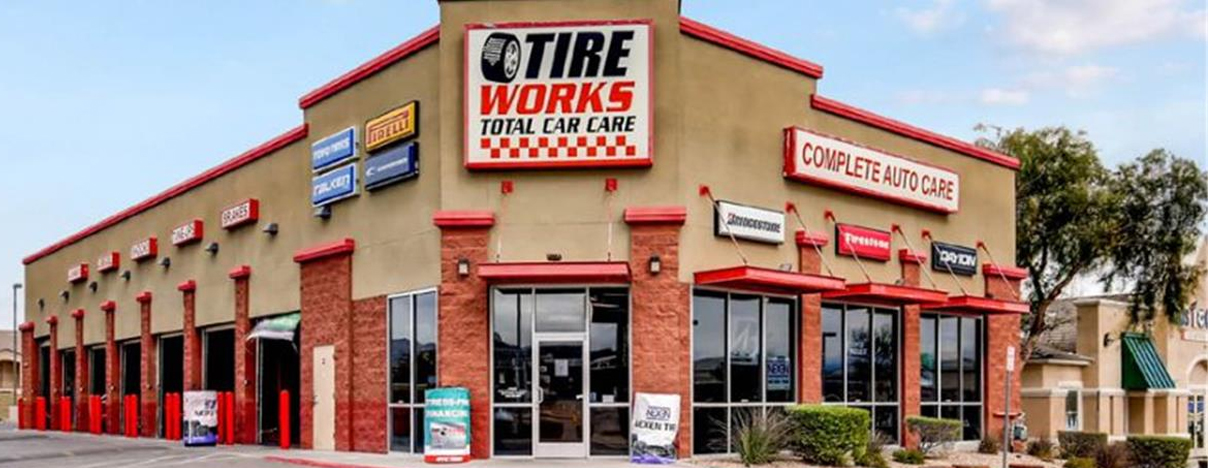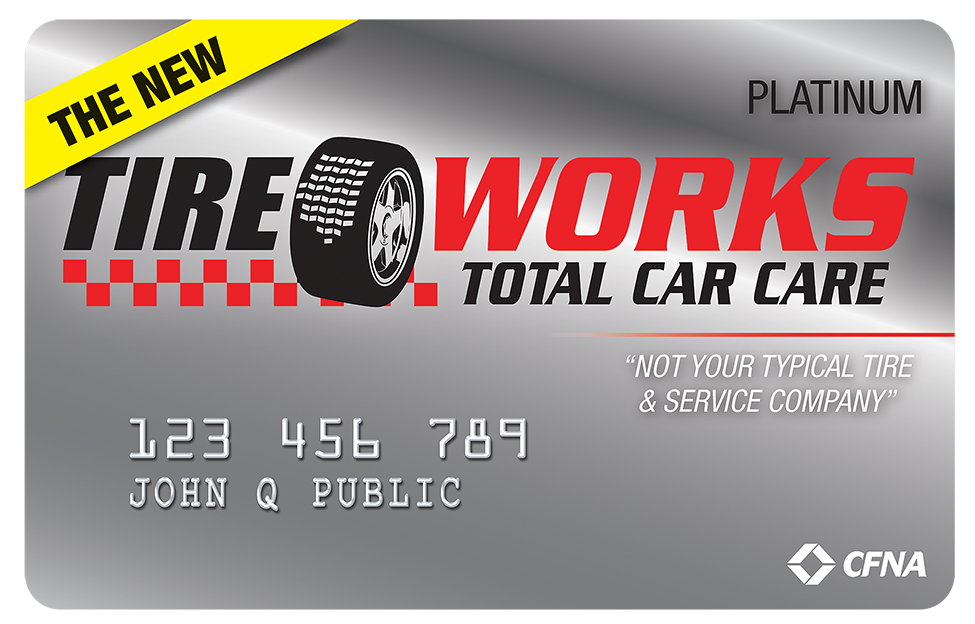Transmission Shop Guide: Everything You Should Know About Your Car’s Transmission

Few systems play a more crucial role in your vehicle’s operation than its transmission. However, the transmission isn’t something many car owners can fix themselves. This component is highly complicated—automatic transmissions incorporate everything from computer controls to mechanical, electrical, and hydraulic systems. Because of this, you’ll need a trustworthy auto shop for your transmission service and transmission repair needs.
If you need a transmission shop in Las Vegas, NV, come to Tire Works Total Car Care. Our technicians are Automotive Service Excellence (ASE)-certified and factory-trained, so they understand how to maintain and fix all sorts of transmissions. In this article, we’ll take a closer look at the basics of your transmission and how we can keep it running smoothly.
What Is A Transmission?
Before you start looking for transmission problems, it’s essential to know just what a transmission is. This system is more elaborate than many other elements in a vehicle, but having a solid understanding of the basics can go a long way.
Put simply, a transmission is a metal box containing various gears. This engine component converts power to torque. If you’re not familiar with torque, don’t fret—this term describes a force that rotates wheels and other objects around an axle or axis. Thanks to the transmission, your engine can make your vehicle move.
Since it’s an essential part of any car, you have to ensure your transmission is up to speed. Without a functioning transmission, it doesn’t matter how robust your engine is—you won’t be able to get anywhere.
Automatic vs. Manual Transmissions
Of course, not all transmissions are the same. You’ll also need to understand the two types of transmission varieties used in today’s vehicles—manual and automatic transmissions.
In cars or trucks with manual transmissions, the driver is responsible for changing gears with a stick shift. To shift gears, a driver must use the clutch pedal situated to the left of the brake pedal.
As their name implies, automatic transmissions can change gears without driver involvement. They use hydraulic or electronic systems to monitor various factors, including the vehicle’s RPM and traveling speed. Thanks to this information, these systems can shift gears accordingly. Because of this, cars with automatic transmissions do not have clutch pedals or stick shifts.
Today, almost all drivers in America use automatic transmissions. However, manual transmissions are still considered standard in Europe and are popular here among some drivers of high-performance sports cars. Ultimately, either transmission type is a viable option—your decision should depend on what you are most comfortable with when you go to shop for your next vehicle.
How To Identify Transmission Problems
Whether you prefer manual or automatic transmissions, it’s crucial to watch for potential transmission problems in your vehicle. This process is not as simple as checking your oil level, but there are a few telltale signs to be wary of.
Gears Slipping
An automatic transmission needs to keep track of gear shifts. If your gears are too slippery, your transmission may accidentally shift from “drive” to “neutral,” which can cause significant problems on the road.
Unexpected Noise
Do you hear odd noises when your car is accelerating or in neutral? It could be a sign of transmission trouble. Take grinding, bumping, and any other strange sounds seriously!
Burning Odor
There’s no scenario where a burning smell coming from your car is a good thing. One potential source of this is increased friction in your engine due to broken-down transmission fluid. But no matter what’s causing this smell, your car needs professional attention.
Check Engine Light On
It’s hard to say what car problem this light indicates without taking your car in for service. Still, transmission problems are a definite possibility. Instead of ignoring this warning light, have your vehicle looked at ASAP.
Fluid Issues
Any fluid leak in your vehicle is cause for concern. Transmission fluid leaks are easy enough to spot—this fluid smells sweet, drips from under the center of your car, and usually is red.
If your car’s transmission fluid level is low, there’s a good chance you have a leak. To check your fluid level, find your car’s transmission fluid dipstick—it’s separate from the dipstick used for oil, and it should be in the engine compartment under the hood. With your vehicle idling, pull the dipstick out, wipe it off, and put it back in. When you pull it out again, you’ll be able to check the fluid level the same way you’d use a dipstick to check oil levels. (If you can’t find a transmission dipstick under your hood, you probably have a sealed transmission that doesn’t require fluid replacement.)
Even if you haven’t encountered any of these issues yet, it may still be a good idea to set up an appointment for transmission maintenance. Getting this work done every 30,000 miles or so can keep your car’s transmission running smoothly while lowering your risk of a breakdown.
Why Choose Us As Your Transmission Shop?
As a resident of Las Vegas, NV, you have many auto shops to choose from when you need transmission repair. Finding the best auto shop for this vital service is more complicated than choosing one at random. Still, it could make the difference between getting your transmission fixed right away and continuing to deal with these problems for months (if not years) to come.
At Tire Works Total Car Care, we pride ourselves on being the best transmission shop in Las Vegas. Our business has a long history of satisfied customers thanks to our:
- Highly qualified employees. The technicians at Tire Works are ASE-certified—meaning they’re more than capable of working on even the most intricate transmissions.
- Affordable prices. Since transmission repair is exceptionally complex, it can be a significant expense. Save as much as you can by choosing a reputable shop like Tire Works for the job.
- Free quotes. You’ll never be caught off-guard by your transmission repair costs when you choose us. We provide detailed quotes before work begins, free of charge.
- Wide variety of services. If your car needs work on more than just its transmission, you won’t need to take it anywhere else. We provide a full range of other auto care services, too.
- Flexible scheduling options. Depending on your needs, you can set up an appointment online, over the phone, or in person.
Our Transmission Services
Whether you need major transmission repairs or a simple transmission fluid change, Tire Works Total Car Care is here to help with these services and more:
Transmission Maintenance
If it’s been a while since the last time someone looked at your transmission, set up an appointment at your nearest Tire Works location. Our team will start by looking at your vehicle’s transmission fluid level and inspecting the transmission itself. After that, we’ll take care of transmission pan service and a complete transmission flush.
Transmission Repair
Are you dealing with an overheating transmission or other transmission problems? If so, there’s a good chance you’ll need transmission repair services. During your appointment, try to explain the issues you’re experiencing in detail to help streamline the diagnostic process. From there, we can take care of everything from minor fixes to large-scale repair work. Meanwhile, we’ll do everything we can to keep your transmission repair costs under control.
Set Up Your Appointment Today!
If you suspect your car’s transmission needs some TLC, there’s no need to wait. Schedule an appointment with Tire Works Total Car Care—we can get your vehicle back in shape in no time! To keep your expenses to a minimum, visit our coupon page for additional saving opportunities.
Transmission Guide Frequently Asked Questions
Is it better to rebuild or replace a transmission?
As a Las Vegas-area driver, it’s easy to understand why you’d want to take good care of your transmission. It’s one of the most important systems in any vehicle, to the point where it’s nearly as crucial as the engine itself. When your transmission needs attention, you’ll want to work with a qualified transmission shop in Las Vegas like Tire Works Total Car Care.
Of course, the type of work your transmission needs will vary based on the extent of its damage and several other factors. With that in mind, it’s impossible to say whether rebuilding or replacing a transmission is the “better” option for your vehicle. These are two entirely different services—rebuilding a transmission is ideal in some situations while replacing it is ideal in others.
If you opt for a complete custom transmission rebuild, the Tire Works team will take your transmission apart, inspect every component and make sure these parts are in full working order, and put it back together again. Our mechanics will also replace any damaged parts and thoroughly test your rebuilt transmission to make sure it’s as good as new.
In most situations, a transmission rebuild will be enough to get your Las Vegas vehicle back on the road. However, that doesn’t account for unusually severe damage—in this case, your transmission could be beyond the point of repair and your only option may be to have it entirely replaced. Transmission replacement can be more expensive than a transmission rebuild, but the team at Tire Works will give you the best possible rate for your new or used transmission.
What are the signs of a blown transmission?
No one in Nevada wants to deal with transmission failure, but problems with this system are a fact of life. The first step towards dealing with your blown transmission is realizing it’s failed in the first place.
If you suspect you’ve encountered transmission problems, keep an eye out for these telltale signs:
- Unexplained noises. Switching gears shouldn’t make a noticeable sound in your car. Your transmission may be to blame if you notice grinding or clunking during gear shifts.
- A “burning” odor. Your transmission fluid should have a “tart” or “sweet” smell, but it also isn’t something you should smell on a daily basis. When you start to smell something burning in your car, it could very well be transmission fluid.
- Gear shifting troubles. Since your transmission’s job is to help you shift gears, it stands to reason that shift-related issues may be linked to this system. It could be the result of anything from a worn clutch (if you have a manual transmission) to worn-out gears or low fluid levels (in an automatic transmission).
- Slippage. If you live in Las Vegas, you shouldn’t usually have to drive on snow—but your car might act like you are. This condition, known as “slippage,” indicates that your transmission is having problems driving your vehicle forward.
- Excess cabin heat. Sometimes, you might be able to feel transmission heat coming into your passenger compartment. Where you’ll feel this heat in your cabin depends on whether your car uses front or rear-wheel drive.
If your vehicle displays any of these warning signs, you can’t afford to wait. Instead, schedule an appointment at your nearest Tire Works location today!
How long should a transmission last?
Just like every other part of your vehicle, your transmission’s lifespan will depend on one thing—how well you take care of it. If you’re diligent about keeping up with your transmission’s maintenance needs, it can last up to 300,000 miles or more. But if you neglect transmission care, it could start having problems as early as the 100,000-mile mark.
Transmission maintenance is a complicated process best left to the professionals. In Las Vegas, make sure to visit Tire Works for the best transmission service in town. Our mechanics are ready to work on everything from a simple transmission flush to a full-on transmission rebuild—all for surprisingly low costs!
What typically causes transmission issues?
Since transmissions are so complicated, it stands to reason that many different things can go wrong. In fact, there are four leading causes of transmission failure:
- Leaking/low transmission fluid. Without transmission fluid lubricating your transmission’s moving parts, it won’t be able to function smoothly. That’s why low transmission fluid is the number-one cause of transmission failure.
- Worn-out gears. Have you started to feel an unpleasant “clunking” sensation during gear shifts? When that happens, there’s a good chance that one or more of your transmission’s parts are worn down and being prevented from functioning as they should.
- Clogged transmission filters. As you might expect, your transmission filter is intended to clean your transmission fluid. But a dirty filter can make it all but impossible for this fluid to pass through properly. When that happens, it won’t be long before transmission parts begin to overheat.
- Subpar clutch performance. Do you drive a vehicle with a manual transmission? If so, it’s best to keep a close eye on your clutch. A worn-out clutch is no longer properly connected to your transmission, which can lead to transmission failure before you know it.
Will my car run better with a new transmission?
A new transmission comes with no shortage of benefits for your vehicle. Just for starters, your replacement transmission will almost certainly run smoother and quieter than your old system. At the same time, your car will get more miles per gallon thanks to your new transmission’s reduced friction.
The key to enjoying the benefits of a new transmission is to have it installed and maintained by knowledgeable, reputable Las Vegas mechanics. Since Tire Works is the area’s go-to garage for transmission service, get started by finding your nearest Tire Works location today!
Is a transmission flush really necessary?
Transmission fluid is a bit like engine oil in that it helps keep your transmission lubricated and fully functional. But just like engine oil, this fluid can get dirty if left alone for too long. When that happens, it will become markedly less effective.
If your last transmission flush took place a while ago, it’s best not to put this auto maintenance job off any longer. Regular transmission flushes can increase your transmission’s lifespan, give you better fuel efficiency, help protect your warranty, and improve your overall driving experience.
Is it essential to change transmission fluid?
Of course—but it’s also crucial for Las Vegas drivers to understand what service they need when it’s time for a fluid change. Despite its name, a transmission fluid change doesn’t involve removing all your car’s transmission fluid; however, most of the fluid is replaced. Still, you’ll need to get a full transmission flush at some point to completely remove your dirty transmission fluid. This job uses a flush machine to take fluid out of your transmission pan, cooler lines, and torque converter, making it the most effective type of transmission fluid service.
As a rule of thumb, drivers in Las Vegas should get transmission fluid changes every 30,000 miles or so. Along with that, it’s wise to get a transmission flush every 50,000 miles. No matter which of these services you need, be sure to get your transmission fluid taken care of at Tire Works!











